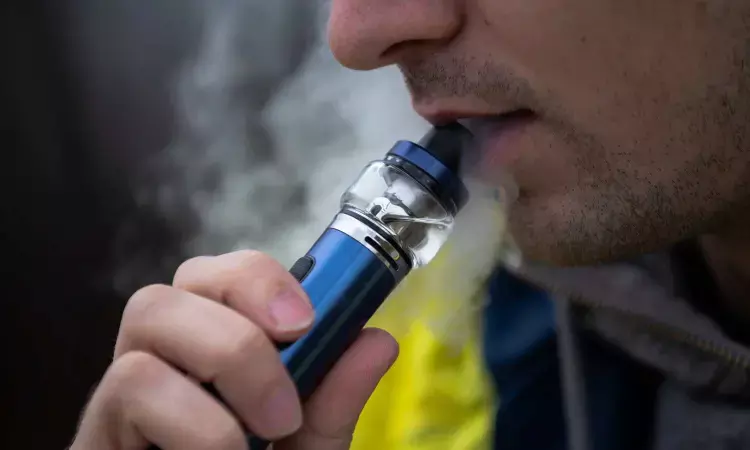- Home
- Medical news & Guidelines
- Anesthesiology
- Cardiology and CTVS
- Critical Care
- Dentistry
- Dermatology
- Diabetes and Endocrinology
- ENT
- Gastroenterology
- Medicine
- Nephrology
- Neurology
- Obstretics-Gynaecology
- Oncology
- Ophthalmology
- Orthopaedics
- Pediatrics-Neonatology
- Psychiatry
- Pulmonology
- Radiology
- Surgery
- Urology
- Laboratory Medicine
- Diet
- Nursing
- Paramedical
- Physiotherapy
- Health news
- Fact Check
- Bone Health Fact Check
- Brain Health Fact Check
- Cancer Related Fact Check
- Child Care Fact Check
- Dental and oral health fact check
- Diabetes and metabolic health fact check
- Diet and Nutrition Fact Check
- Eye and ENT Care Fact Check
- Fitness fact check
- Gut health fact check
- Heart health fact check
- Kidney health fact check
- Medical education fact check
- Men's health fact check
- Respiratory fact check
- Skin and hair care fact check
- Vaccine and Immunization fact check
- Women's health fact check
- AYUSH
- State News
- Andaman and Nicobar Islands
- Andhra Pradesh
- Arunachal Pradesh
- Assam
- Bihar
- Chandigarh
- Chattisgarh
- Dadra and Nagar Haveli
- Daman and Diu
- Delhi
- Goa
- Gujarat
- Haryana
- Himachal Pradesh
- Jammu & Kashmir
- Jharkhand
- Karnataka
- Kerala
- Ladakh
- Lakshadweep
- Madhya Pradesh
- Maharashtra
- Manipur
- Meghalaya
- Mizoram
- Nagaland
- Odisha
- Puducherry
- Punjab
- Rajasthan
- Sikkim
- Tamil Nadu
- Telangana
- Tripura
- Uttar Pradesh
- Uttrakhand
- West Bengal
- Medical Education
- Industry
Cytisinicline can help people quit vaping, shows JAMA study

Eleven million U.S. adults use e-cigarettes to vape nicotine, and about half of them say that they want to stop, but many have trouble doing so because nicotine is an addictive drug.
A plant-based medication called cytisinicline may be an effective therapy to help them stop vaping, according to the results of a new clinical trial co-led by an investigator from Massachusetts General Hospital, a founding member of the Mass General Brigham healthcare system. The trial’s findings are published in JAMA Internal Medicine.
In the double-blind randomized clinical trial, 160 adults who vaped nicotine but did not currently smoke cigarettes were assigned to take either oral cytisinicline or placebo tablets for 12 weeks. All participants had weekly behavioral support to stop vaping.
At the end of treatment, participants receiving cytisinicline were more than twice as likely as those receiving placebo to have successfully abstained from vaping for weeks 9 to 12 (31.8% vs 15.1%, p=.04). The drug was well tolerated, with comparable rates of side effects between the groups. The study was conducted at Massachusetts General Hospital and 4 other sites.
“No medication has been approved by the FDA for vaping cessation in the United States,” said lead author Nancy A. Rigotti, MD, director of Massachusetts General Hospital’s Tobacco Research and Treatment Center and a professor of medicine at Harvard Medical School. “Our study indicates that cytisinicline might be an option to fill this gap and help adult vapers to stop using e-cigarettes.”
The team tested cytisinicline for vaping because the drug binds to nicotine receptors on brain cells. In their previous clinical trial, the research team found that cytisinicline helped people to quit smoking traditional cigarettes. They hypothesized that it might also help people to stop vaping nicotine. “The results of our study need to be confirmed in a larger trial with longer follow-up,” said Rigotti, “but they are promising.”
Reference:
Rigotti NA, Benowitz NL, Prochaska JJ, et al. Cytisinicline for Vaping Cessation in Adults Using Nicotine E-Cigarettes: The ORCA-V1 Randomized Clinical Trial. JAMA Intern Med. Published online May 06, 2024. doi:10.1001/jamainternmed.2024.1313.
Dr Kamal Kant Kohli-MBBS, DTCD- a chest specialist with more than 30 years of practice and a flair for writing clinical articles, Dr Kamal Kant Kohli joined Medical Dialogues as a Chief Editor of Medical News. Besides writing articles, as an editor, he proofreads and verifies all the medical content published on Medical Dialogues including those coming from journals, studies,medical conferences,guidelines etc. Email: drkohli@medicaldialogues.in. Contact no. 011-43720751


